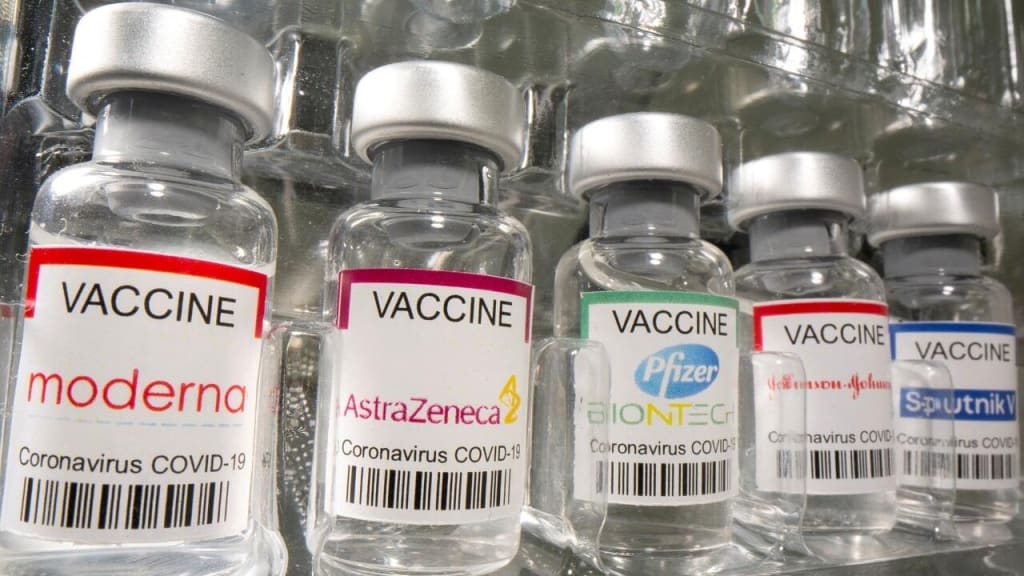
COVID-19 Vaccine Linked to Short-Term Changes in cycle Length, Study Suggests
But, doctors note that the “vaccine doesn't affect fertility in the slightest degree.”
A new study shows that women may experience short-term changes in their menstrual cycles after the COVID-19 vaccination.
The researchers found that these changes were related to all COVID-19 vaccine types. But, experts still recommend that folks who menstruate and receive their COVID-19 vaccines.
“The excellent news from the information is that the changes were temporary and short-lived without long-term consequences."
Since the primary wave of COVID-19 vaccinations became available, we've continued to be told more and more about how the shot affects our bodies, with the side effects being of little consequence. And while this remains true, a brand new study suggests that the COVID-19 vaccine may affect your period.
Specifically, medical professionals have now identified a possible link between COVID-19 vaccination and short-term changes in oscillation length and regularity. The study (the largest one to date) was published last week by researchers from the University of Illinois, Urbana-Champaign and its findings have already raised several eyebrows. Questions for those who menstruate.
Early in 2021, many of us began sharing that they experienced unexpected menstrual bleeding after receiving their initial COVID-19 vaccine. To research this phenomenon further, researchers asked 39,129 individuals who received a two-dose SARS-CoV-2 vaccination a series of questions on period changes and vaccine experiences.
In this sample, 42% of individuals with regular menstrual cycles said that they bled more heavily than usual after getting vaccinated, while 44% reported no change. Among respondents who typically don't menstruate, 71% of individuals on long-acting reversible contraceptives, 39% of individuals on gender-affirming hormones, and 66% of postmenopausal women reported breakthrough bleeding.
“The vaccine doesn’t affect your fertility the least bit.”
Researchers also found that increased/breakthrough bleeding after vaccination was significantly related to older age, systemic vaccine side effects (fever and/or fatigue), a lighter than usual menorrhea, having previously been pregnant or born, and ethnicity—specifically Hispanic/Latinx. For non-menstruating premenopausal people, a breakthrough The bleeding was more likely if they'd previously been pregnant and/or born. For postmenopausal people, breakthrough bleeding was more likely for those who were Hispanic/Latinx. Lastly, regularly menstruating people with endometriosis, menorrhagia, fibroids, and PCOS were slightly more likely to experience heavier bleeding.
ADVERTISEMENT - CONTINUE READING BELOW
Ultimately, the results from this study demonstrated that respondents within the sample who menstruate regularly were about equally likely to have no bleeding changes after vaccination in the slightest degree or to possess heavier periods after vaccination. In this way, the smaller proportion of individuals had lighter periods. The study highlighted that “generally, changes in menstrual bleeding don't seem to be uncommon or dangerous, yet attention to those experiences is critical to making trust in medicine.”
Furthermore, it’s important to notice the restrictions of this study. Because this study solely supported personal responses from participants, the results may be skewed thanks to self-reporting bias. And for women experiencing menstrual changes, it is more likely to have completed the survey. Additionally, this study didn't compare the results with an effective group of individuals who were unvaccinated.
Kate White, M.D., professor of OB/GYN at Boston University School of Medicine and author of Your Sexual Health: A Guide to Understanding, Loving, and Caring for Your Body, agrees that this study is proscribed by the web-based design. “In addition, a really high percentage of the respondents could It It does not reflect the experiences of all people. But the size of the study (over 39,000 people) is an unbelievable strength.
Still, these findings are in line with smaller studies that have reported menstrual changes after vaccination while utilizing an impact group (unvaccinated people).
What should we remove from these new findings?
Many women noticed changes in their oscillation after receiving the COVID vaccine and their concerns were often ignored or they were told their cycle was impacted by anxiety. This study highlights the very fact that girls know their bodies best and also that the changes weren't in their "heads," but rather a true side effect of the vaccine. The expert, Jennifer Wider, M.DA, a women’s health expert, adds that “the excellent news from the information is that the changes were temporary and short-lived without long-term consequences."
“There’s no long-term impact on your periods.”
These new findings will likely affect how medical professionals consider the after-effects of the COVID-19 vaccines and can require further consideration of menstrual health in trials for other vaccines. Dr. Wider says, "This study emphasizes" It It is important for researchers to watch menstrual health in future vaccine trials and to urge a much better handle on the underlying biological mechanisms at play. "
Should people with periods still get vaccinated?
The answer is yes. “All people, whether or not they menstruate, should get the COVID vaccine,” says Dr. White. “It’s important for doctors to counsel patients that the vaccine may temporarily disrupt their periods, but there’s no long-term impact on your periods, and therefore the vaccine doesn’t affect your fertility in any respect.”
Dr. White continues, saying, “COVID-19 continues to be a heavy infection for several people, and everybody is in danger of repeated infection with the new variants (though the vaccine still provides protection from both any infection and from severe infection)...so the protection of the vaccine becomes paramount. "becomes paramount." becomes paramount. "becomes paramount." becomes paramount. "It is well worth the short-term mucking around with your periods."
ADVERTISEMENT - CONTINUE READING BELOW
Given that the menstrual changes seen in The participants of the study were temporary and short-lived. Dr. Wider agrees, saying that “the importance of getting vaccinated far outweighs the short-term risk of getting a change in your oscillation.”
Dr. Wider adds that this study “should raise awareness for girls who have irregular periods or lighter bleeding cycles that they'll experience changes or heavier bleeding, which would be likely caused by the vaccine.” So, ultimately, the study should function as a possible explanation for heavier menstrual cycles in some. post-vaccination.
Can the COVID-19 infection affect menstruation as well?
According to Dr. Wider, “women who had COVID have reported a change in their oscillation.” However, more studies are definitely needed to tease out why this will be the case.
“Any infection (or serious stress) can affect your periods..and early studies have shown that COVID-19 infection can change your periods in multiple ways,” says Dr. White. “The amount of bleeding you see can change—most often, it results in a lighter period, but some People experience heavier influxes. The timing of your bleeding will be altered too—sometimes your next period comes early, and your next period often comes late (or not at all). And these disruptions could also be present for an "Extended time
Still, Dr. Wider points out, despite reports that ladies who had COVID-19 have reported changes in their menstrual cycles, “more studies are definitely needed to tease out why that will be the case.”
The bottom line
Getting vaccinated remains essential. But, it's always an honest idea to trace your menstrual cycles. And it’s especially prudent to watch your period following vaccination. But rest assured that if you are experiencing short-term irregularities in your cycle, there’s no need to be alarmed, says Dr. Wider. “If irregular patterns persist, it might be wise to bring it to the attention of a healthcare provider."
About the Creator
Adam MR24
Welcome to my page, where you will find valuable information that can change your life! Whether you're looking to improve your health, learn new skills, or simply gain a new perspective on the world, you've come to the right place.






Comments
There are no comments for this story
Be the first to respond and start the conversation.